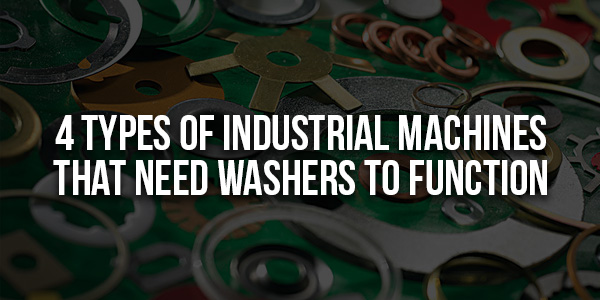
Nuts, bolts, and washers work together to safely and robustly fasten machines together. Almost every industry uses washers to help hold its equipment together. Here’s more about washers and a look at four types of industrial machines that need washers to work properly.
Table of Contents
Understanding Industrial Washers:
Industrial washers are often just flat discs, but they help nuts and bolts work better by fitting under the bolt head to evenly disperse pressure. They may also act as spacers or seals. Industrial washers are often metal, but they can be plastic or rubber. When you use bolts without washers, fastening pressure may not disperse, leaving the bolt susceptible to breaking or pulling out when stressed. Industrial washers can also help prevent leaks by sealing fastener holes.
Agricultural:
In agriculture, everything from tractors and harvesters to blemish sorters and milking machines use washers to reduce fastening stress and form tight, leak-free connections. It’s difficult to imagine an agricultural machine that doesn’t benefit from precision industrial washers. If a single connection fails, an entire operation may have to shut down while you repair the problem.

Transportation:
Lives depend on the strength and reliability of fasteners used in transportation. Cargo trailers, passenger cars, buses, and railway engines are among the transportation industry machines that carry people and equipment around the nation. If fasteners fail on one of these machines, the results can be catastrophic. The related aerospace industry requires high-stakes fasteners too.
Manufacturing:
Assembly lines depend on tight, dependable fasteners to keep moving. Conveyor belts, assembly robots, and other manufacturing machines often involve many moving parts, each joined with connectors that often contain industrial washers. Because manufacturing involves significant vibrations and constant movement, specialized washers are usually required to withstand the stress.
Construction:
Road, commercial buildings, and residential construction projects use heavy machinery like earth movers and cranes that rely on strong nuts, bolts, and washers to hold them together. Failure could mean injury to the user and damage to nearby structures. Fastener failure delays work and push back the completion date too. Additionally, the construction industry depends on manufactured products and the transportation industry for the materials it needs.
It’s no overstatement to say that American industry requires washers to function. Every industry that uses machines with moving parts or mechanically joined components relies on strong, specialized industrial washers. Agriculture, transportation, manufacturing, and construction machines are just a few examples of industrial machine types that couldn’t operate if washers were unavailable.

 About the Author:
About the Author:
















Be the first to write a comment.